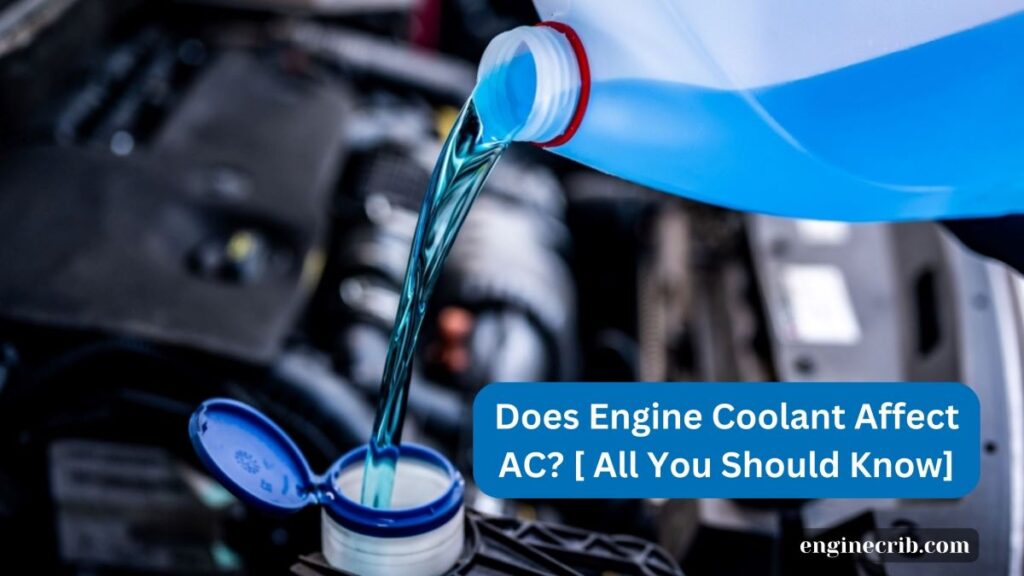Your air conditioning system is a crucial component of your vehicle, providing much-needed relief on hot summer days.
But did you know that the engine coolant in your car can also have an impact on the performance of your AC?
In this post, we’ll explore the relationship between engine coolant and AC and how properly maintaining your coolant levels can help ensure optimal AC function.
We’ll also discuss some common signs that your AC system may be experiencing issues and how to address them. But first, let’s understand what an engine coolant is and why it’s important.

What is an Engine Coolant?
Engine coolant is a combination of water, antifreeze, and other additives that helps to regulate the temperature of your engine and improve its performance.
The antifreeze is usually mixed with water to prevent the water from boiling and freezing during hot or cold weather, which would otherwise cause the engine block to split.
In addition to regulating the engine temperature, coolant also helps to lubricate the engine’s working parts to prevent damage to the water pump, head gasket, piston timing, and cooling system.
How Does an Engine Coolant Work?
Your car engine, which is the source of power, produces intense heat and, without proper protection, can overheat and result in damage.
So, this fluid (coolant) absorbs excess heat from the engine and circulates it to keep the engine from overheating and making it perform at its best.
Most vehicles store the engine coolant in a reservoir near the radiator and the water pump circulates it through the engine.
The coolant flows through the outer casing, called the water jacket into the engine, to maintain the temperature and prevent the engine from overheating. After which it further flows through the hoses and then to the radiator, where it finally cools down.
This process helps to remove rust particles and dirt that can clog up the cooling system. This is why it’s important to drain out the coolant and refill the system with a fresh coolant when necessary.
Does Engine Coolant Affect AC?
Engine coolant does not directly affect the operation of an air conditioning system. However, if the engine is not running at the proper temperature, it can affect the overall performance of the vehicle, including the air conditioning system.
If the engine is running too hot, it can cause the air conditioning compressor to shut off, which would affect the performance of the air conditioning system.
It is important to make sure that the engine coolant is at the proper level and that the cooling system is functioning properly to ensure the overall performance of the vehicle.
Symptoms of Engine Coolant Affecting the AC
1. The AC Compressor Shuts off
If your engine is running too hot, the air conditioning compressor may shut off in order to prevent further strain on the engine.
2. Reduced Cooling Performance
If your engine is not running at the proper temperature, it can affect the overall performance of the vehicle, including the air conditioning system. This can cause the air conditioning system to produce less cool air than it normally would.
3. Strange Smell
If your engine coolant is leaking, it can cause a sweet, antifreeze-like smell to be emitted from the vents. This can indicate a problem with the cooling system.
4. Overheating Engine
If your engine coolant level is low, it can cause the engine to overheat. This can lead to further problems with the vehicle, including the air conditioning system.
How often Should an Engine Coolant be Replaced?
You should typically cleanse and replace the coolant system at least every 50,000 miles. Although, every 10,000 miles, certain newer models may need their coolant serviced.
The amount of time you change your coolant is dependent upon your car. This is why the manufacturer’s instructions should always be followed while maintaining and replacing your coolant or antifreeze, just like all other fluids an engine needs to function properly.
Frequently Asked Questions
Are Coolants the Same as Antifreeze?
These terms are usually used interchangeably. However, they are not the same. Coolants are antifreeze diluted with water. Whereas antifreeze is a concentrated, glycol-based liquid.
What are the Signs of Low Coolant?
When your engine coolant is low, there are a few signs to look out for. The most obvious is the temperature gauge on your dashboard. If it starts creeping into the red, that means your engine is overheating.
Other signs include steam coming from under the hood, or fluid leaking from under the car. If you notice either of these, pull over immediately and call a tow truck.
Read: Will a Bad fan Clutch Cause AC Problems?
Conclusion
It is important to maintain the proper level of engine coolant and ensure that the cooling system is functioning properly.
While engine coolant does not directly affect the operation of the air conditioning system, a problem with the cooling system can cause the air conditioning compressor to shut off and reduce the overall performance of the vehicle. This includes the AC system.
Maintaining the health of the cooling system is essential for the overall performance and longevity of your vehicle, so be sure to keep an eye on the engine coolant level and address any issues as they arise.